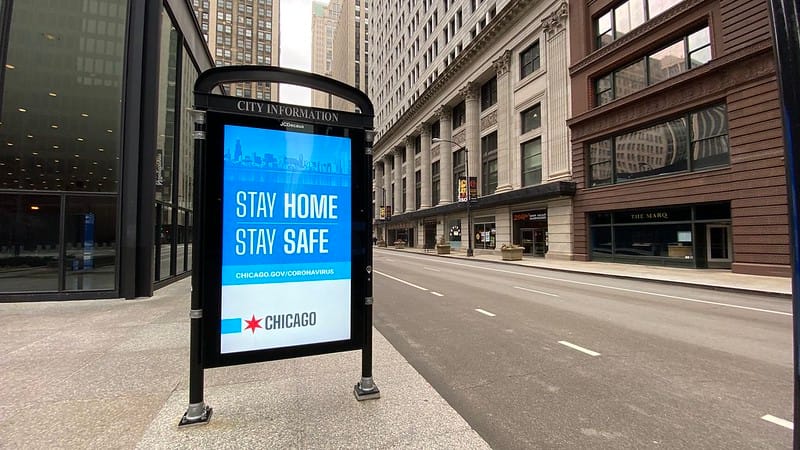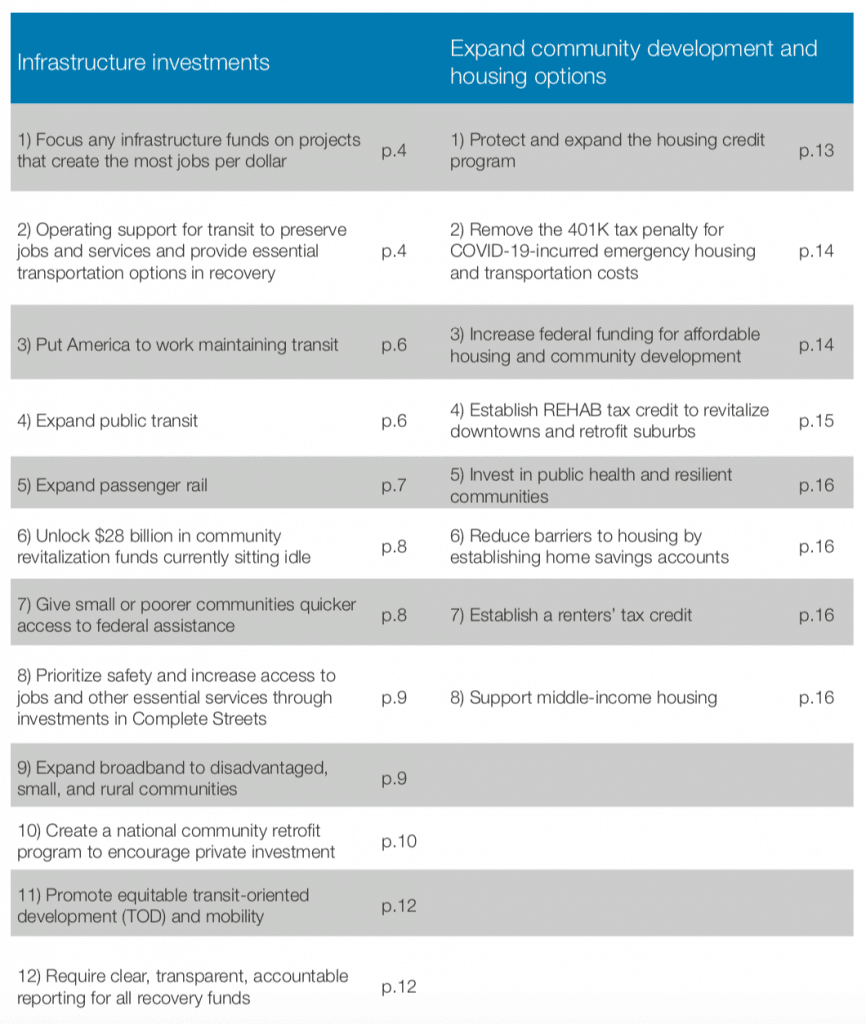
News
By LOCUS Admin, April 3, 2020
This page was created to provide LOCUS members and supporters with the most up-to-date information on COVID-19; we will continue to update this Resource Page as new information becomes available. Last updated on: April 21, 2020.
For more information on protecting yourself and your community during the coronavirus pandemic, please visit the Centers for Disease Control and Prevention (CDC) website.

As communities across the country battle COVID-19, LOCUS is committed to providing our members and supporters with timely updates and transparent resources that help keep your communities, families, and businesses safe and resilient.
Below, you will find the most up-to-date information on federal, state, and local responses to COVID-19, land use, housing, and real estate resources, small business support, and more.
Last month, Congress passed three coronavirus response bills. A fourth coronavirus stimulus package is expected after Congress returns to Washington on April 20.
- Coronavirus Preparedness and Response Supplemental Appropriations Signed into law by the president on March 6, 2020. The bill provided $8.3 billion in emergency funding for federal agencies to respond to the coronavirus outbreak. $6.7 billion (81%) was designated for the domestic response and $1.6 billion (19%) for the international response.
- Families First Coronavirus Response Act Signed into law by the president on March 18, 2020. The bill provided $104 billion to address paid sick leave, insurance coverage of coronavirus testing, nutrition assistance, and unemployment benefits.
- Coronavirus Aid, Relief, and Economic Security (CARES) Act Signed into law by the president on March 27, 2020. The $2 trillion legislation contains new funding for housing, transportation, education, healthcare, and economic development; it includes tax relief measures to support individuals through the distribution of recovery checks and through the implementation of special rules for early withdrawal from retirement funds. Businesses and corporations will benefit from modifications to the Tax Cuts and Jobs Act and delayed tax payments.
Congress and the Administration will continue to develop economic recovery legislation over the coming weeks and months. Not only will they need to prioritize immediate, emergency steps required to avert economic disaster, they will need to focus on catalyzing a long-lasting recovery.
On April 1, Smart Growth America, Transportation for America, and LOCUS issued their 20 Recommendations for Emergency Stabilization and Economic Recovery. These include:

For a full explanation of the above recommendations, click here.
State and local governments are taking diverse policy interventions to help “flatten the curve,” keep residents safe, and help businesses continue to operate in communities across the country. Keep track of these efforts below.
- State-by-state Construction Status (via Duane Morris)
- Coronavirus Updates and Resource Center, including a map of legislative and appropriations responses by state(FiscalNote)
- Tracker of state and local COVID-19 small business relief programs (Living Cities)
- COVID-19 Local Action Tracker (National League of Cities)
- What steps have states taken to address Coronavirus? (National Governors Association)
- Tracker for transportation-related community responses to COVID-19 (National Complete Streets Coalition)
The impact of COVID-19 has been immediately felt by renters, homeowners, and the real estate development and investment community. Facing job and income loss, construction moratoriums, and other challenges, LOCUS urges advocates and Congressional lawmakers to consider deliberate action in order to continue to expand the supply of attainable housing options across the country in the face of the ongoing pandemic.
Recommendations
- Bipartisan letter to House leadership with Housing Credit priorities for future COVID-19 relief legislation
- Low-Income Housing Tax Credit Proposals for COVID-19 Relief (via ACTION Campaign)
- Addressing Affordable Housing Challenges in the Midst of COVID-19 (via ACTION Campaign)
- Recommendations to Congress for COVID-19 Relief Package Related to the Low-Income Housing Tax Credit (via ACTION Campaign)
- Proposed Federal Liquidity Solution for the Mortgage Servicing Industry (via National Council of State Housing Agencies)
Resources
- Availability of Waivers and Suspensions of the HOME Program Requirements in response to COVID-19 (via HUD)
- Suspensions and Waivers to Facilitate Use of HOME-Assisted Tenant-Based Rental Assistance (TBRA) for Emergency and Short-term Assistance in Response to COVID-19 Pandemic (via HUD)
- HUD COVID-19 Resources and Fact Sheets
- National Multifamily Housing Council’s Coronavirus Resources for Apartment Firms
- National Housing Conference’s Resources for Every Facet of the Housing Industry
- Local Housing Solutions’ Housing-Related Advice
- Enterprise Community Partners’ Resources for Housing Providers during the COVID-19 Pandemic
COVID-19 will have huge impacts on transit systems across the country, as non-essential workers stay home and regular service is disrupted. The CARES Act provided $25 billion in emergency operating assistance for transit across the country; however, long-term plans for transportation and infrastructure maintenance and investment have not been made.
- Check out SGA’s infrastructure proposals, including investing in projects that create the most jobs, expanding broadband to small and rural communities, and promoting equitable transit-oriented development (TOD), in our 20 Recommendations for Emergency Stabilization and Economic Recovery.
- 2.8 million essential workers use transit to get to their jobs
- Deal struck with $25 billion in emergency funding for transit
- Transit is a public good – let’s treat it that way
Congress’ immediate coronavirus relief packages have expanded funding for numerous community and economic development programs across the country.
The CARES Act includes:
- $1 billion for Community Services Block Grant (CSBG) to help communities address the consequences of increasing unemployment and economic disruption.
- $5 billion added to the Community Development Fund.
Read LOCUS’ summary of the CARES Act for a full list of expanded funding for programs supporting community and economic development programs across America.
Federal agencies and state and local governments have developed grants, loans, and other forms of financial relief programs for small businesses across the country. See below for guides on navigating these expanded resources, databases for finding financing partnerships, and information about how the private sector is helping small businesses out.
Federal Assistance for Small Businesses
- U.S. Small Business Administration’s Coronavirus Small Business Guidance & Loan Resources
- U.S. Chamber of Commerce’s Coronavirus Emergency Loans Small Business Guide and Check-List
Non-Federal Assistance for Small Businesses
- How Small Businesses Can Access Private Sector Grants and Loans During COVID-19 (via FiscalNote)
- Searchable database of grants, loans, and other cash equivalents that can help entrepreneurs, nonprofits, and businesses from Duke University’s Fuqua School of Business
- GoFundMe’s Small Business Relief Fund provides one-time matching grants to qualifying small businesses
- Google’s $800+ Million Crisis Response includes $340 million in Google Ads credits available to all small businesses with active accounts over the past year
Other Resources
- U.S. Senate Committee on Small Business and Entrepreneurship: The Small Business Owner’s Guide to the CARES Act
- U.S. Department of Homeland Security’s Identification of Essential Critical Infrastructure Workers During COVID-19
LOCUS is requesting feedback from members and supporters to help create federal policy proposals that support the post-COVID-19 economic recovery.
At LOCUS, we have a deep understanding of federal programs that can help—and ideas for new programs that can be implemented. But the scale of this crisis is unprecedented in modern times and we could use your help to identify other ways in which the federal response can address state and local issues.
We invite you to take this brief survey to provide your thoughts and ideas. Your survey response can help identify critical issues that aren’t getting attention at the federal level!
Related News

© 2025 Smart Growth America. All rights reserved
Site By3Lane Marketing










